

Wicked Problems. Draus: Restoring Trust in VA Health Care. Mo: Private ACOs look promising. While Medicare's ACOs have had mixed early outcomes, some young commercial accountable care ventures, including PPO plans, are showing promise.

An accountable care organization created by WellPoint’s Anthem Blue Cross of California and HealthCare Partners, covering 55,000 patients, saved $4.7 million in the first half of 2013. Alex E: Obamacare Will Increase Health Spending By $7,450 For A Typical Family of Four. Alyssa: Audit: Over 57,000 New Patients Awaiting Appointments At Veterans Affairs Hospitals, Clinics. WASHINGTON (AP) — More than 57,000 U.S. military veterans have been waiting 90 days or more for their first VA medical appointments, and an additional 64,000 appear to have fallen through the cracks, never getting appointments after enrolling, the government said Monday in a report newly demonstrating how deep and widespread the problem is.

It's not just a backlog issue, the wide-ranging Veterans Affairs review indicated. Thirteen percent of schedulers in the facility-by-facility report on 731 hospitals and outpatient clinics reported being told by supervisors to falsify appointment schedules to make patient waits appear shorter. The audit is the first nationwide look at the VA network in the uproar that began with reports two months ago of patients dying while awaiting appointments and of cover-ups at the Phoenix VA center. "This behavior runs counter to our core values," the report said. Leslie: Development and application of an electronic health record information extraction tool to assess quality of pain management in primary care.
Damian: The Shame of American Health Care. The report found that by virtually all measures of cost, access to care and ease of dealing with insurance problems, Americans fared poorly compared with people in other advanced countries.
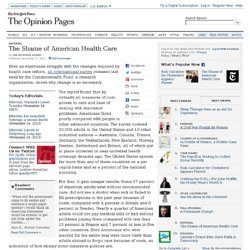
The survey covered 20,000 adults in the United States and 10 other industrial nations — Australia, Canada, France, Germany, the Netherlands, New Zealand, Norway, Sweden, Switzerland and Britain, all of which put in place universal or near-universal health coverage decades ago. The United States spends far more than any of these countries on a per capita basis and as a percent of the national economy. For that, it gets meager results. Some 37 percent of American adults went without recommended care, did not see a doctor when sick or failed to fill prescriptions in the past year because of costs, compared with 4 percent in Britain and 6 percent in Sweden. Brandon: Health Care Reform after the ACA. After a shockingly bad start, the Affordable Care Act (ACA) has completed its first open-enrollment season.
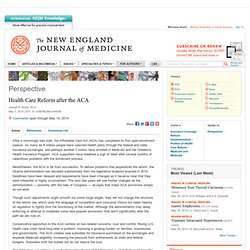
As many as 8 million people have selected health plans through the federal and state insurance exchanges, and perhaps another 3 million have enrolled in Medicaid and the Children's Health Insurance Program. ACA supporters have breathed a sigh of relief after several months of calamitous problems with the enrollment process. Nevertheless, the ACA is far from successful. To defuse problems that jeopardized the reform, the Obama administration has deviated substantially from the legislative blueprint enacted in 2010.
Justin A: ACA for Medical Students. Jen T: Physician Income in The Age of Health Reform. By Hoag Levins... | ...April, 2012 ... | ...
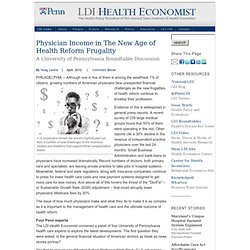
Comment Below PHILADELPHIA -- Although one in five of them is among the wealthiest 1% of citizens, growing numbers of American physicians face unexpected financial challenges as the new frugalities of health reform continue to envelop their profession. Evidence of this is widespread in general press reports. A recent survey of 239 large medical groups found that 55% of them were operating in the red. Other reports cite a 30% decline in the revenue of independent-practice physicians over the last 24 months. Tarek: Mardell: Obamacare on a precarious political tightrope.
2 December 2013Last updated at 22:01 ET The Obama administration has claimed cautiously that the embattled healthcare website has begun to recover At the New Bethel Baptist Church, some are evangelical about Obamacare despite its problems.
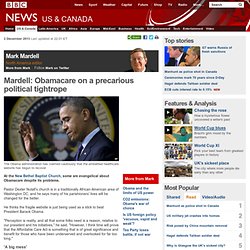
Pastor Dexter Nutall's church is in a traditionally African-American area of Washington DC, and he says many of his parishioners' lives will be changed for the better. He thinks the fragile website is just being used as a stick to beat President Barack Obama. "Perception is reality, and all that some folks need is a reason, relative to our president and his initiatives," he said. Nate: Doctor accused of taking kickbacks to prescribe anti-psychotic drug.
November 15, 2012|Staff report A federal lawsuit accuses a Chicago psychiatrist of getting illegal kickbacks from pharmaceutical companies and submitting at least 140,000 false claims to Medicare and Medicaid for anti-psychotic medications he prescribed for thousands of mentally ill patients in nursing homes.
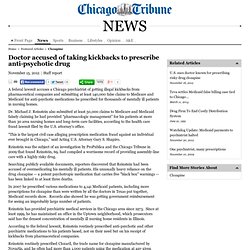
Dr. Michael J. Reinstein also submitted at least 50,000 claims to Medicare and Medicaid falsely claiming he had provided “pharmacologic management” for his patients at more than 30 area nursing homes and long-term care facilities, according to the health care fraud lawsuit filed by the U.S. attorney's office. “This is the largest civil case alleging prescription medication fraud against an individual ever brought in Chicago,” said Acting U.S. Jeremy: The Pain Is Not the Problem: How to Fix America’s Health-Care Crisis. After a second escape attempt, the American hostage was being moved so often, American commandos would've had to raid a dozen safehouses in Pakistan at once.
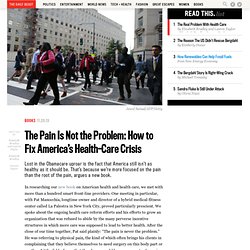
The Pentagon rejected the idea of a rescue mission for Sgt. Bowe Bergdahl because he was being moved so often by his Taliban captors that U.S. special operators would have had to hit up to a dozen possible hideouts inside Pakistan at once in order to have a chance at rescuing him. That’s according to U.S. officials, who also say that the Obama administration also did not want to risk the political fallout in Pakistan from another unilateral U.S. raid, like the Navy SEAL raid that killed al-Qaeda leader Osama bin Laden in 2011. “A rescue mission would have been fraught politically as well as tactically,” according to a senior defense official briefed on the Bergdahl case. Maggie: “I want more time with my doctor”: a quantitative study of time and the consultation.
+ Author Affiliations E-mail: Jane.Ogden@kcl.ac.uk Received October 27, 2003.
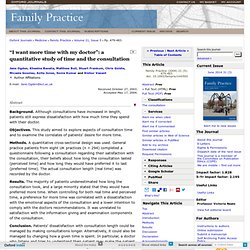
Accepted May 17, 2004. Abstract Background. Although consultations have increased in length, patients still express dissatisfaction with how much time they spend with their doctor. Robin: The US Healthcare System 2010. Problems, Principles, and Potential Solutions.
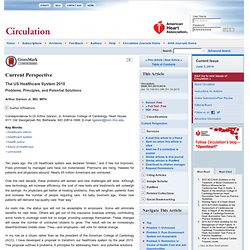
Doug: Health Care Statistics. Healthcare is one of the top social and economic problems facing Americans today. The rising cost of medical care and health insurance is impacting the livelihood of many Americans in one way or another. The inability to pay for necessary medical care is no longer a problem affecting only the uninsured, but is increasingly becoming a problem for those with health insurance as well.
In 2012, nearly half (46%) of adults ages 19 to 64, or an estimated 85 million people, did not have health insurance for the full year (30%, or 55 million) or were underinsured and unprotected from high out-of-pocket costs (16%, or 30 million). Erica: Designing and evaluating complex interventions to improve health care. Nhu: www.painphysicianjournal.com/2012/september/2012;15;E629-E640.pdf. John: Dr. Andrew Weil: What's Wrong With American Medicine? The latest development appears to be that government-run health insurance programs are, if not off the table, at least sliding toward the edge.
Jen M: Cost of Treatment May Influence Doctors. Saying they can no longer ignore the rising prices of health care, some of the most influential medical groups in the nation are recommending that doctors weigh the costs, not just the effectiveness of treatments, as they make decisions about patient care. The shift, little noticed outside the medical establishment but already controversial inside it, suggests that doctors are starting to redefine their roles, from being concerned exclusively about individual patients to exerting influence on how health care dollars are spent. “We understand that we doctors should be and are stewards of the larger society as well as of the patient in our examination room,” said Dr.
Lowell E. Schnipper, the chairman of a task force on value in cancer care at the American Society of Clinical Oncology. Don: Five States' Health-Care Exchanges See Costly Fixes - WSJ. Alex K.: Worse Than They Thought: House Confirms HALF Of All Obamacare Applications Flawed. At least 4 million Obamacare sign-ups have flawed applications out of the 8 million total applications, according to a report released Wednesday by House Republicans. The Energy and Commerce Committee documents double the claims made in an Associated Press report released earlier on Wednesday, which found that according to a May 8 federal slideshow, 2.1 million Obamacare applications had “inconsistencies” in income, immigration and citizenship data. (RELATED: Obamacare Data Flaws Jeopardize Coverage For 1 in 4 Sign-ups) Federal Obamacare contractor Serco compiled a chart for the committee which displays over 4 million application discrepancies by May 27.
The inconsistencies include income, citizenship and immigration, residency, incarceration, Indian status, Social Security number, and eligibility for another federal health program. Chucky: Incorporating Professionalism into Medical Education: The Mayo Clinic. Nico: More Insured, but the Choices Are Narrowing. Dave: Obamacare squeezes small businesses: Column. The way President Obama told it in 2010, Obamacare would save small businesses money. Jena: When It Comes To Health Care, There Are 2 Americas, And These Maps Are Proof.
When it comes to the quality of health care, there are two Americas. Ryan: Physician groups cite major problems with the release of Medicare’s payment data. Jessica: The Well-Adjusted Soul: Fabrizio Mancini DC, Gilles A. LaMarche DC, Donald M. Dible MS: 9780615389608: Amazon.com: Books. Shaon: Barlett & Steele, Critical Condition. Critical Condition: How Health Care in America Became Big Business — and Bad Medicine More than 100 million Americans with inadequate or no medical coverage . . . Charlie: The Five Biggest Problems In Health Care Today. Diana: Playing Politics with the Doctor–Patient Relationship. Camara: Conquering the doctor shortage. Dia: The Interaction of Patient Perception of Overmedication with Drug Compliance and Side Effects.
Dia: Why are patients shut out of the debate over prescription pain medicine? Danielle: Most physicians would forgo aggressive treatment for themselves at the end of life, study finds- Office of Communications & Public Affairs - Stanford University School of Medicine. My Trinh: The Biggest Reason People Didn't Sign Up For Obamacare. The top reason uninsured people didn't enroll in coverage under Obamacare this year is they still don't feel like they can afford health insurance, according to a new survey. The findings in a report published by the Henry J. Andrew: TIME magazine cover story on health care costs opens necessary wound. Grace: Now, Even Your Grandmother Hates Obamacare. Vanessa: www.commonwealthfund.org/~/media/Files/Publications/Issue Brief/2010/Mar/1384_Thomson_primary_care_prescription_drugs_intl_ib_325.pdf.
Nyarai: Patient mobility in the global marketplace: a multidisciplinary perspective.